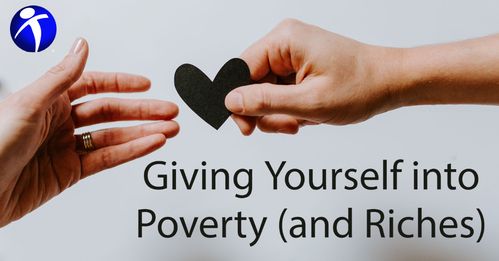Giving Yourself into Poverty (and Riches)

The Pixar movie Up takes all of about five minutes to summarize the married lives of Carl and Ellie Fredricksen. It’s a truly touching tribute (in a kid’s movie no less!) to the highs and lows of married life. I’d daresay most married couples can identify with at least one recurring theme in those five minutes: breaking into the savings jar for one emergency after another. Chances are you’ve heard the old adage: “Save for a rainy day!” Carl and Ellie were actually saving for a trip to Paradise Falls, but I’m sure they were very thankful to have some money set aside when those rainy days came.
Contrast that advice and the Fredricksen’s savings habits with the incredible generosity we see among early Christians: “Nor was there anyone among them who lacked; for all who were possessors of lands or houses sold them, and brought the proceeds of the things that were sold, and laid them at the apostles' feet; and they distributed to each as anyone had need” (Acts 4:34-35). These early Christians didn’t just dip into their savings; they sold their land AND their houses for each other!
What happens if a rainy day comes after you’ve literally sold your house for someone else’s rainy day? We don’t have to wonder if a rainy day came for those charitable Christians; in fact, a “great famine” struck the entire Jewish world (Acts 11:28). The “poor among the saints who [were] in Jerusalem” (Romans 15:26) had no savings accounts to dip into; those who had enough to get by had nothing to give to their poorer brothers and sisters. Evidently, their giving had opened the door to poverty.
Should early Christians have kept their houses, stuck their coins in a jar like Carl and Ellie? The beauty of God’s plan for giving is that if they had done so, they would never have been able to endure the famine. You see, their generosity didn’t just extend to physical needs or to those in Judea; they sent out missionaries like Barnabas to help newly formed congregations outside Judea (Acts 11:22). Barnabas was eventually joined by Saul (who later became Paul), and their missionary work resulted in Antioch becoming a missionary sending church itself (Acts 13:1-3). Antioch also sent monetary relief to Judea (Acts 11:29), as did many of the churches began through its efforts (Romans 15:26).
Judging from Paul’s scattered references to the Jewish famine in his epistles, the famine lasted for years – much longer than the Judean Christian’s savings accounts would have! So, the next time you’re tempted to prioritize saving over giving, remember, “There is one who scatters, yet increases more; And there is one who withholds more than is right, but it leads to poverty. The generous soul will be made rich, and he who waters will also be watered himself” (Proverbs 11:24-25).
Contrast that advice and the Fredricksen’s savings habits with the incredible generosity we see among early Christians: “Nor was there anyone among them who lacked; for all who were possessors of lands or houses sold them, and brought the proceeds of the things that were sold, and laid them at the apostles' feet; and they distributed to each as anyone had need” (Acts 4:34-35). These early Christians didn’t just dip into their savings; they sold their land AND their houses for each other!
What happens if a rainy day comes after you’ve literally sold your house for someone else’s rainy day? We don’t have to wonder if a rainy day came for those charitable Christians; in fact, a “great famine” struck the entire Jewish world (Acts 11:28). The “poor among the saints who [were] in Jerusalem” (Romans 15:26) had no savings accounts to dip into; those who had enough to get by had nothing to give to their poorer brothers and sisters. Evidently, their giving had opened the door to poverty.
Should early Christians have kept their houses, stuck their coins in a jar like Carl and Ellie? The beauty of God’s plan for giving is that if they had done so, they would never have been able to endure the famine. You see, their generosity didn’t just extend to physical needs or to those in Judea; they sent out missionaries like Barnabas to help newly formed congregations outside Judea (Acts 11:22). Barnabas was eventually joined by Saul (who later became Paul), and their missionary work resulted in Antioch becoming a missionary sending church itself (Acts 13:1-3). Antioch also sent monetary relief to Judea (Acts 11:29), as did many of the churches began through its efforts (Romans 15:26).
Judging from Paul’s scattered references to the Jewish famine in his epistles, the famine lasted for years – much longer than the Judean Christian’s savings accounts would have! So, the next time you’re tempted to prioritize saving over giving, remember, “There is one who scatters, yet increases more; And there is one who withholds more than is right, but it leads to poverty. The generous soul will be made rich, and he who waters will also be watered himself” (Proverbs 11:24-25).
-Patrick Swayne
Recent
Archive
2026
2025
January
March
April
May
June
July
September
October
November
2024
January
February
March
May
July
August
September
October
November
2023
January
February
